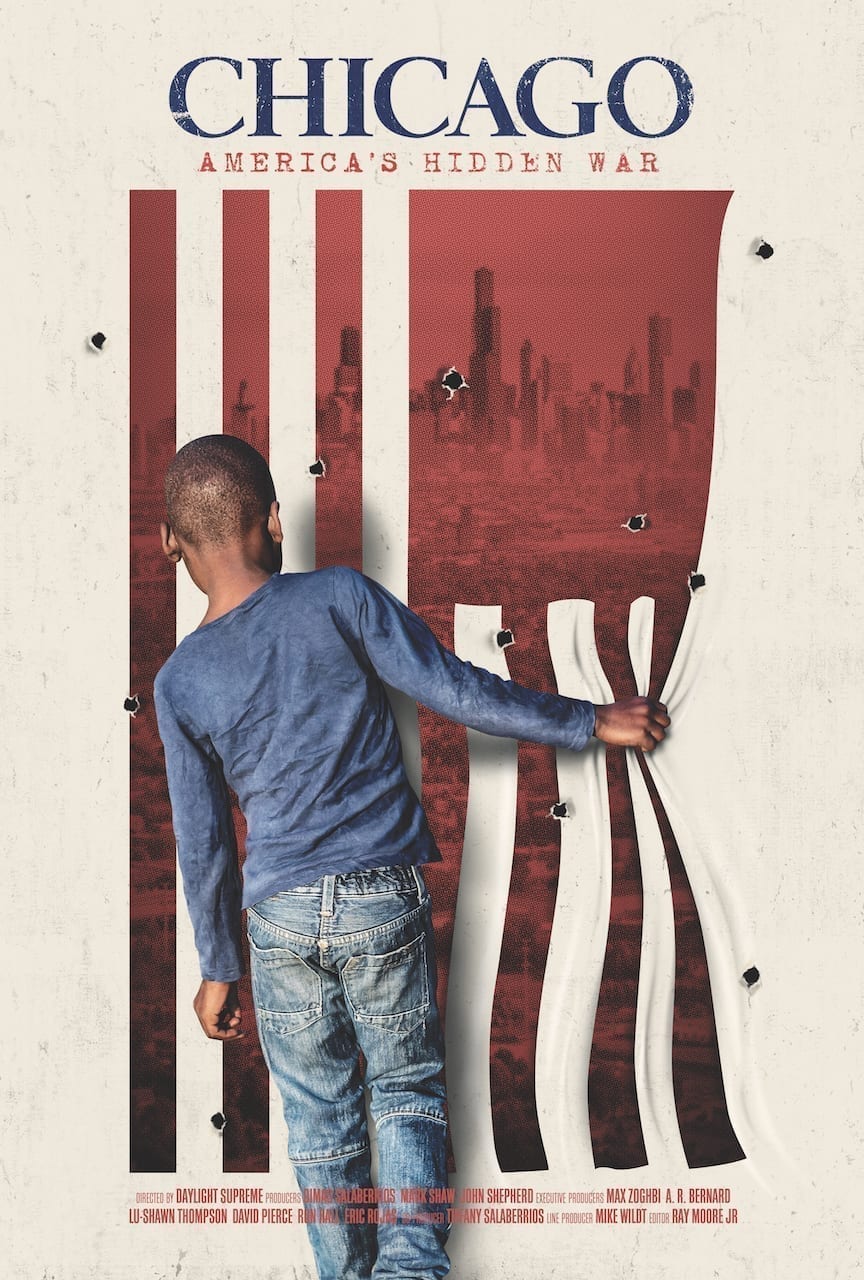Behind the Scenes of Chicago: America’s Hidden War, With Executive Producer and Six+One Founder, Eric Rojas.
By The Chicago Egotist / /

Chicago: America’s Hidden War is a revealing documentary from CineLife Entertainment® that dives into the history of Chicago’s street violence and its effect on the community. The 120 minute film–directed and produced by Dimas and Tiffany Salaberrios’ (whose previous credits include the critically acclaimed Emanuel, which tells the true story of the 2015 shooting at the Emanuel AME Church in Charleston, South Carolina)–pulls back the curtain to expose the pervasive genocidal-like behavior in Chicago (mainly the south side) and examines what birthed and contributed to this war, and why so little has been done to stop it.
Shockingly, there have been 10,000 deaths from street violence in Chicago since 2001 compared to ~7,000 in Iraq and Afghanistan combined. Chicago takes a war correspondent approach to examine the origins of local violence, the policy failures that continue to sustain it, and the corrosive impact on the community. It highlights children in some of the worst-hit neighborhoods in particular, the constant anxiety they live in of being shot (or having a loved one shot), and how hard this made it to focus on school even before the pandemic. The film features Interviews with former gang leaders, politicians, pastors and community members provide a raw, on-the-ground account of the last 2 decades and ultimately serves as an inspiration for a clear path toward change, presenting viewers with an action plan on how to get involved and create a better future or the Chicago community.
View the trailer here.
We spoke with one of the film’s executive producers, Eric Rojas, founder of NY creative agency Six+One, about how this film came to light, the people who have stepped out in support of its message, why that message is more relevant now than ever, and what the ad community can learn from projects like this:
Egotist: You’re one of four producers on Chicago: America’s Hidden War (Mark Shaw, John Sheperd and Miss Muffet Studios are the others). How did you come to be involved in this project?
Rojas: I became a producer on Chicago: America’s Hidden War after working alongside its director Dimas Salaberrios in the movement we created called “Stop The Silence,” an initiative to help restore peace, bring comfort to George Floyd’s family and supporters, honor black lives lost, lead prayers for healing, and champion justice. We conducted peaceful protests to oppose the systemic racism and police brutality taking place across America. Through our efforts, we decided to continue working together, and I joined him and the team to help produce the film and continue to help underserved communities on a more local level to make a difference one child at a time.
Egotist: Crime and violence have been prevalent in Chicago’s inner city for quite some time. Why was now the right moment for the film’s launch? Do you feel the country’s current cultural climate has given way to a more captive, responsive audience? Or on the contrary, do you feel people today need to be reminded more than ever of the true struggles happening in their own backyard?
Rojas: Chicago is one of the most dangerous cities in our country; since 2001, there have been over 10,300 senseless deaths. That’s more than our fallen soldiers who died in Afghanistan and Iraq combined. And the violence in Chicago last year was at a staggering high, with 774 people killed due to gang violence. So we knew we had to get the film out this year to shed light on the climate of Chicago’s inner city.
Unfortunately, Chicago has been used as a political ploy for both parties but very little has been done to help make a real difference. In return, it feels as if American’s have turned a blind eye to what’s happening there. Commonly we will hear Americans say, “they are doing this to themselves,” which is an easy way out of caring. The stark reality is that many are implicitly fine with what’s happening, and that’s the problem. What we attacked in this film and the platform we created was our biggest enemy, apathy. We want to turn Americans from apathy to empathy and to do so we have to educate and expose the real truth about Chicago’s inner city. The film is a well-timed instrument of change and action in the community and America at large.
Egotist: A lot of important people have stepped out in support of this movie, especially when it comes to helping to give inner city youth a chance to see the film in theaters. Can you talk about this a bit?
Rojas: It was an honor to have celebrities standing with us and supporting Chicago’s youth by buying out theaters to allow young people most affected by the violence to attend the movie for free. The film sparks reflection on their choices and the overall effects violence has on children, families, and the community. A growing list of celebs joined in this buyout effort include Denzel and Pauletta Washington, Charlamagne tha God, Mark Burnett, Roma Downey, Willie Robertson, Darryl Strawberry, Dexter Darden, JoJo, Curtis Martin, Dean and Scott Winters, Angie Stone, BeBe Winans, Clifton Davis, and more. But this is just the beginning. We need everyday Americans to stand up and say no longer will this be seen as Chicago’s hidden war. This Is Our War.
Egotist: What was the greatest moment for you in helping to make this film? What was the most challenging?
Rojas: The most significant moment in helping to make the film was to know that we were not just creating a film, but a catalyst for change.
The most challenging thing was seeing the pain and hurt in the children’s eyes and the community at large. It was one of the heaviest projects I’ve ever worked on. It was something we all had to take home with us every day. There were numerous times during working on the project that we had to take a moment to collect ourselves. What kept us going was the realization that this needed to be seen and heard to truly make a difference in Chicago’s inner-city lives.
Egotist: Talk about the involvement of your agency, Six+One, in bringing the film to both the big screen and to audiences at large.
Rojas: As an agency that dedicates our talents and time to help create real change for people who socially are not being heard, what’s happening in Chicago was something we couldn’t ignore.
Six+One was one of the production studios that helped produce the film, from the story arch, to editing, graphics, logo, branding, and building out the platform to make the film more than a film but a catalyst for change. We treated the film as we do any client, building out a strategy and audience segmentation to help craft the story to engage with our audience at large. We created the look/feel, branding, logo, colors, graphics, and platform.
Our single most important goal was education and exposure. We worked to shed light on individual stories of those who live in Chicago’s inner city through an immersive 360 campaign that brings accountability to individuals who have watched the film to take a stand and create change. We used powerful and impactful quotes from the film in our wild postings, trailers, commercials, pre-roll, paid, and organic social. Our website Chicagoshiddenwar.com further educates the audience by shedding light on the unsung heroes of Chicago driving people to support them through donations.We’re continuing to build hope in Chicago through grassroots initiatives by connecting people to the community through education, street outreach, and mentorship programs.
Egotist: As an agency, Six+One has done quite a bit in the way of social justice. Talk briefly about one of these initiatives and why it’s so important you and your team continue to take on projects with real purpose, beyond just during or in response to big cultural “moments”.
Rojas: We firmly believe it takes both education and exposure to empathize with another person, so we dedicate our talents and time to help people who are socially not being heard. We strive to build movements in our communities, not just campaigns. People who need support don’t want to feel you are using them for your agenda but that you are there even when nobody’s looking, and that the support is genuine. When they realize this, they go from defense to offense and are willing to receive what you have to offer. And this takes time. This makes the difference.
One initiative near to our hearts is a non-profit we created called ‘For The Greater Hood’ that empowers homeless individuals and families by restoring a sense of dignity, value, and healthy community into their lives. Over the past year alone “For The Greater Hood” gave back to over 10,000 homeless individuals, opening pop-up shops in Brooklyn, Harlem, and Patterson, NJ. Our guests received a branded gift card used as a payment method to get three brand new outfits, haircuts, and new kicks. To ensure all guests could attend, we offered bus shuttles to and from all shelter locations. We acquired all store merchandise via corporate sponsors, including Global Brands, Frye Shoes, Nike, Estée Lauder, Think Royln, Nine West, and more.
Egotist: Finally, as an agency owner with day-to-day clients, talk about how to manage your time and talent when it comes to passion projects.
Rojas: We believe we can make a difference and money at the same time. It shouldn’t be one or the other. And we’ve proven that with the work we’re doing for both our clients and for social justice. We believe that what you value determines what you do. We value people and open up a conversation for people to see either a product, category, or world from a different perspective.
It’s this passion that fuels great work. It keeps our agency moving forward as a tight group of individuals who want to make a difference, whether it’s reinventing a brand, redefining a category, or reshaping culture; we have full buy-in from our employees. It’s what makes them go above and beyond to make a difference in this world and for our clients.

Comments